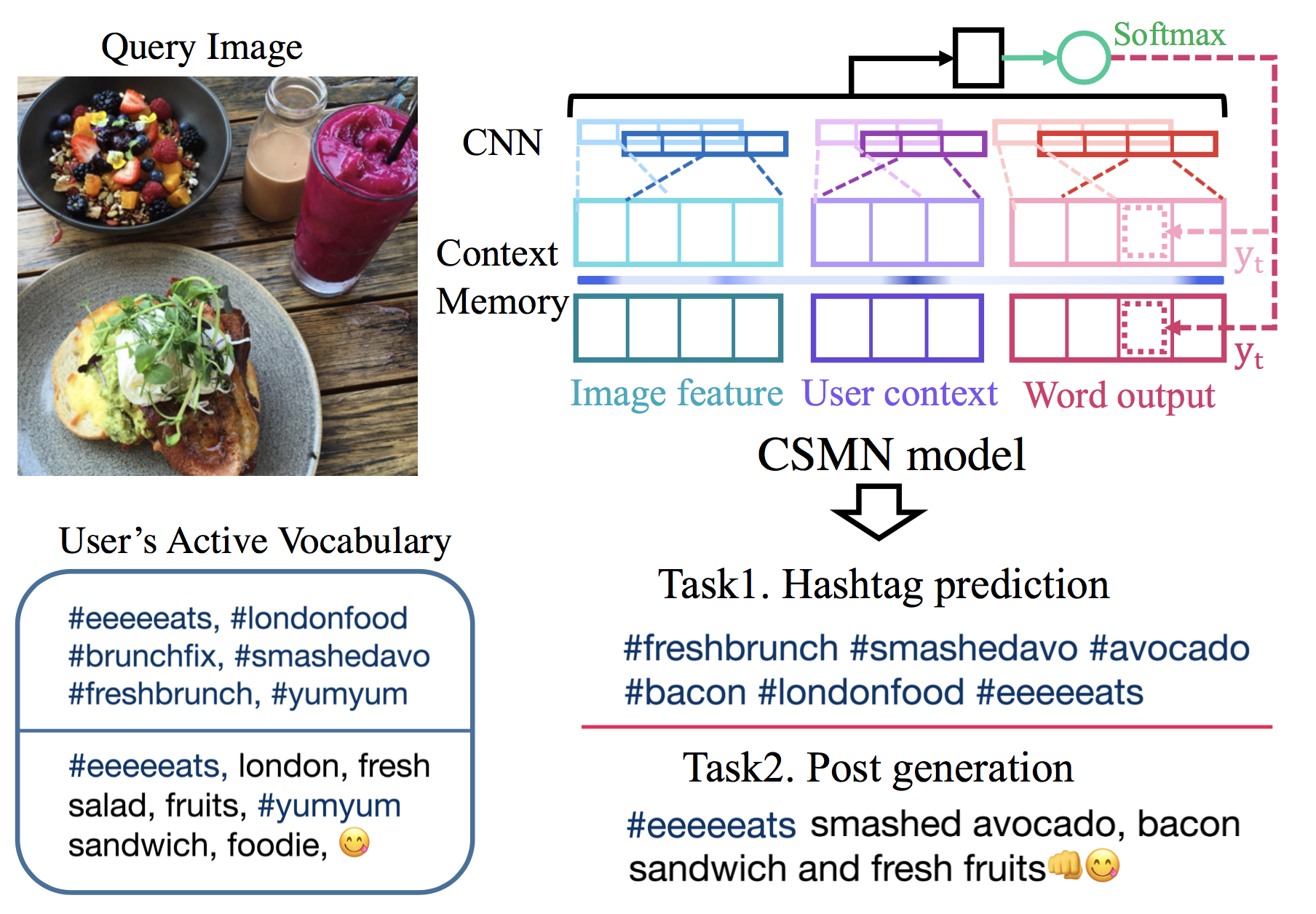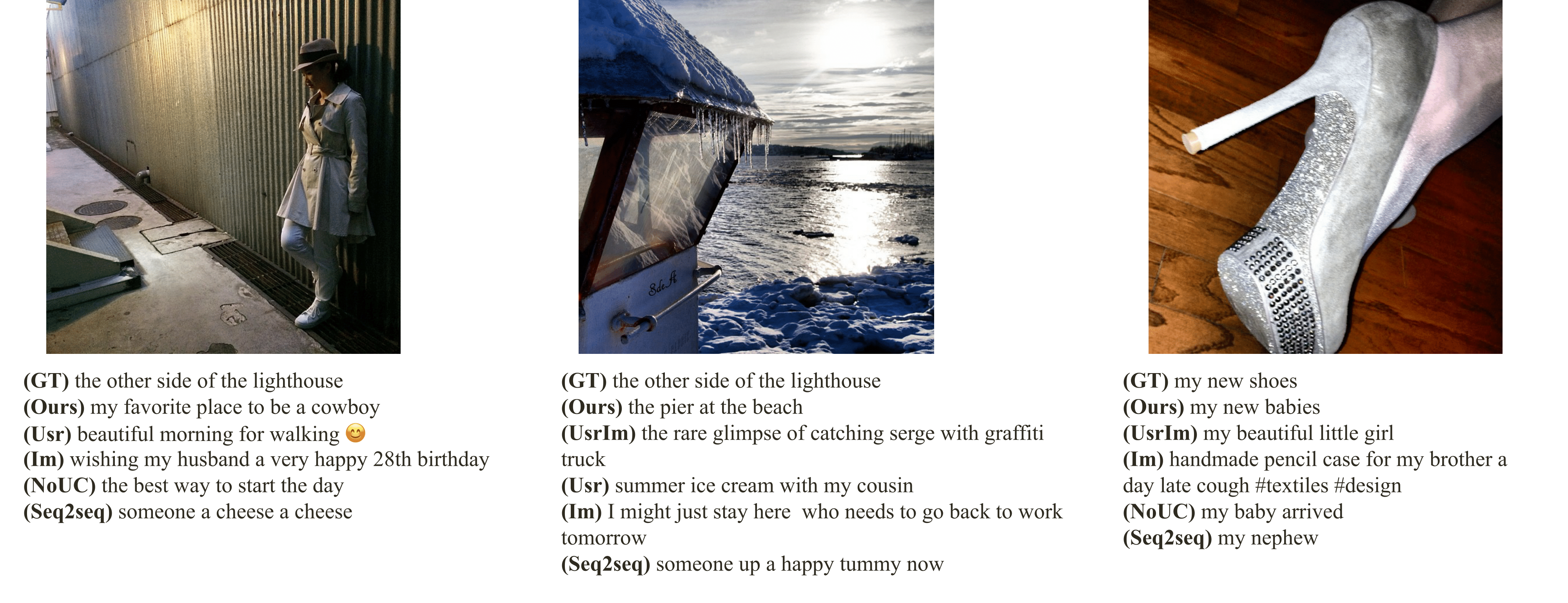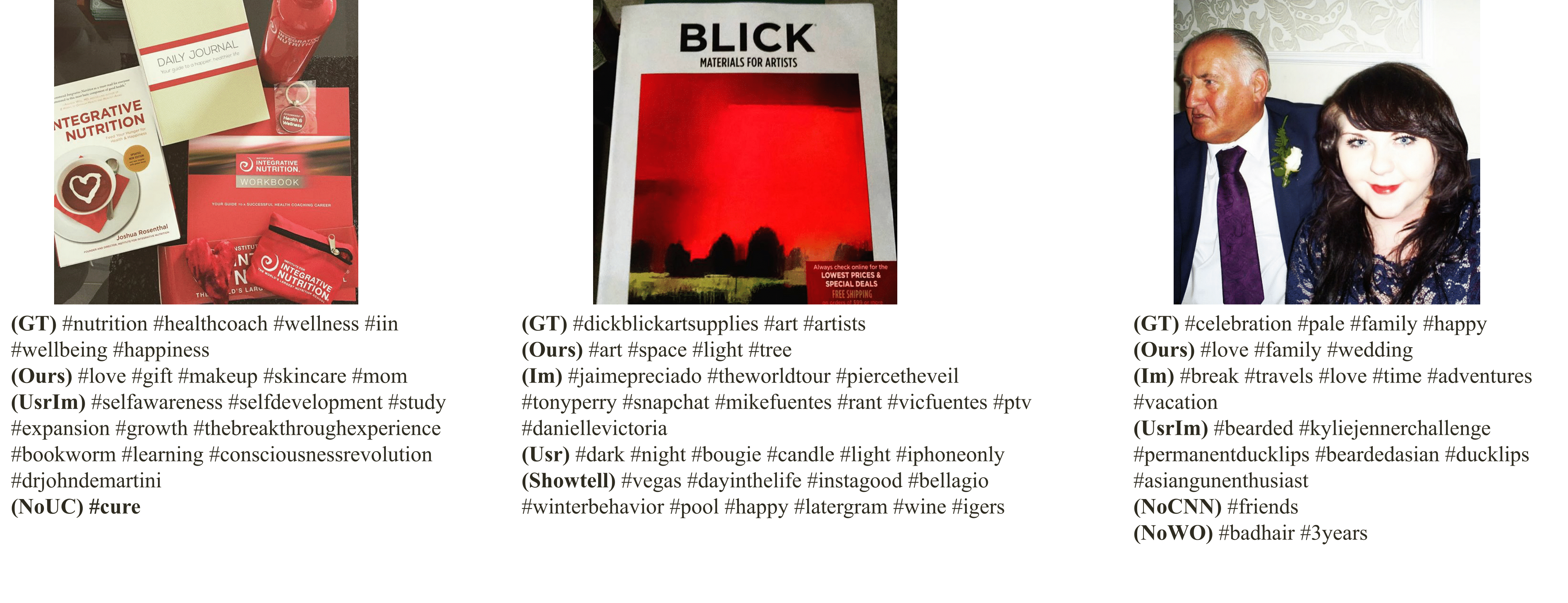This project hosts the code for our CVPR 2017 paper and TPAMI 2018 paper.
- Cesc Chunseong Park, Byeongchang Kim and Gunhee Kim. Attend to You: Personalized Image Captioning with Context Sequence Memory Networks. In CVPR, 2017. (Spotlight) [arxiv]
- Cesc Chunseong Park, Byeongchang Kim and Gunhee Kim. Towards Personalized Image Captioning via Multimodal Memory Networks. In IEEE TPAMI, 2018. [pdf]
We address personalization issues of image captioning, which have not been discussed yet in previous research. For a query image, we aim to generate a descriptive sentence, accounting for prior knowledge such as the user's active vocabularies in previous documents. As applications of personalized image captioning, we tackle two post automation tasks: hashtag prediction and post generation, on our newly collected Instagram dataset, consisting of 1.1M posts from 6.3K users. We propose a novel captioning model named Context Sequence Memory Network (CSMN).
If you use this code or dataset as part of any published research, please refer one of the following papers.
@inproceedings{attend2u:2017:CVPR,
author = {Park, Cesc Chunseong and Kim, Byeongchang and Kim, Gunhee},
title = "{Attend to You: Personalized Image Captioning with Context Sequence Memory Networks}",
booktitle = {CVPR},
year = 2017
}
@inproceedings{attend2u:2018:TPAMI,
author = {Park, Cesc Chunseong and Kim, Byeongchang and Kim, Gunhee},
title = "{Towards Personalized Image Captioning via Multimodal Memory Networks}",
booktitle = {IEEE TPAMI},
year = 2018
}
git clone https://github.com/cesc-park/attend2u
- Install python modules
pip install -r requirements.txt
- Download pre-trained resnet checkpoint
cd ${project_root}/scripts
./download_pretrained_resnet_101.sh
- Download our IntaPIC-1.1M dataset and (optionally) YFCC100M dataset
Download data from the links below and save it to ${project_root}/data.
[Download json (InstaPIC-1.1M)] [Download images (InstaPIC-1.1M)]
cd ${project_root}/data
tar -xvf json.tar.gz
tar -xvf images.tar.gz
Optionally, you can also download our personalized image captioning split of YFCC100M dataset
Download data from the links below and save it to ${project_root}/data_yfcc.
[Download json (YFCC100M)] [Download images (YFCC100M)]
cd ${project_root}/data_yfcc
tar -xvf yfcc_json.tar.gz
tar -xvf yfcc_images.tar.gz
- Generate formatted dataset and extract Resnet-101 pool5 features
cd ${project_root}/scripts
./extract_features.sh
For YFCC100M dataset, run the following commands
cd ${project_root}/scripts
./extract_yfcc_features.sh
Run training script. You can train the model with multiple gpus.
python -m train --num_gpus 4 --batch_size 200
You can also run training script with YFCC100M dataset.
python -m train --num_gpus 4 --batch_size 200 --data_dir ./data_yfcc/caption_dataset
Run evaluation script. You can evaluate the model with multiple gpus
python -m eval --num_gpus 2 --batch_size 500
You can also run evaluation script with YFCC100M dataset.
python -m eval --num_gpus 2 --batch_size 500 --data_dir ./data_yfcc/caption_dataset
InstaPIC-1.1M is our newly collected Instagram dataset, where PIC denotes Personalized Image Captioning.
For dataset collection, we select 270 search keywords by gathering the 10 most common hashtags for each of the following 27 generated categories of Pinterest: celebrities, design, education, food, drink, gardening, hair, health, fitness, history, humor, decor, outdoor, illustration, quotes, product, sports, technology, travel, wedding, tour, car, football, animal, pet, fashion and worldcup.
Key statistics of InstaPIC-1.1M dataset are outlined below. We also show average and median (in parentheses) values. The total unique posts and users in our dataset are (1,124,815/6,315)
| Dataset | #posts | #users | #posts/user | #words/post |
|---|---|---|---|---|
| caption | 721,176 | 4,820 | 149.6 (118) | 8.55 (8) |
| hashtag | 518,116 | 3,633 | 142.6 (107) | 7.45 (7) |
If you download and uncompress the dataset correctly, structure of dataset will follow the below structure.
{project_root}/data
├── json
│ ├── insta-caption-train.json
│ ├── insta-caption-test1.json
│ ├── insta-caption-test2.json
│ ├── insta-hashtag-train.json
│ ├── insta-hashtag-test1.json
│ └── insta-hashtag-test2.json
└── images
├── {user1_id}_@_{post1_id}
├── {user1_id}_@_{post2_id}
├── {user2_id}_@_{post1_id}
└── ...
We provide two types of test set, test1 and test2. Test1 is generated by split whole dataset by user, which means user contexts shown in this test set does not appear in training phase. Test2 is generated by split whole dataset by posts, which means user context shown in this test set can be appear in training phase. Since we do not provide validation set, we highly recommend you to split validation set from training set.
YFCC100M (Yahoo Flickr Creative Commons 100 Million Dataset) consists of 100 million Flickr user-uploaded images and videos between 2004 and 2014 along with their corresponding metadata including titles, descriptions, camera types and usertags. We processed a series of filtering to make personalized image captioning split of YFCC100M. We regard the titles and descriptions as captions and usertags as hashtags.
Key statistics of personalized image captioning splitted YFCC100M dataset are outlined below. We also show average and median (in parentheses) values. The total unique posts and users in our dataset are (867,922/11,093)
| Dataset | #posts | #users | #posts/user | #words/post |
|---|---|---|---|---|
| caption | 462,036 | 6,197 | 74.6 (40) | 6.30 (5) |
| hashtag | 434,936 | 5,495 | 79.2 (49) | 7.46 (6) |
If you download and uncompress the dataset correctly, structure of dataset will follow the below structure.
{project_root}/data_yfcc
├── json
│ ├── yfcc-caption-train.json
│ ├── yfcc-caption-test.json
│ ├── yfcc-hashtag-train.json
│ ├── yfcc-hashtag-test1.json
│ └── yfcc-hashtag-test2.json
└── images
├── {user1_id}_{post1_id}
├── {user1_id}_{post2_id}
├── {user2_id}_{post1_id}
└── ...
We provide one type of test set for image captioning and two types of test set for hashtag prediction.
Here are post generation examples:
Here are hashtag generation examples:
Here are hashtag and post generation examples with query images and multiple predictions by different users:
Here are (little bit wrong but) interesting post generation examples:
Here are (little bit wrong but) interesting hashtag generation examples:
We implement our model using tensorflow package. Thanks for tensorflow developers. :)
We also thank Instagram for their API and Instagram users for their valuable posts.
Additionally, we thank coco-caption developers for providing caption evaluation tools.
We also appreciate Juyong Kim, Yunseok Jang and Jongwook Choi for helpful comments and discussions.
We are further thankful to Hyunjae Woo for help with YFCC100M dataset preprocessing and Amelie Schmidt-Colberg for carefully correcting our English writing.
Cesc Chunseong Park, Byeongchang Kim and Gunhee Kim
Vision and Learning Lab @ Computer Science and Engineering, Seoul National University, Seoul, Korea
MIT license





